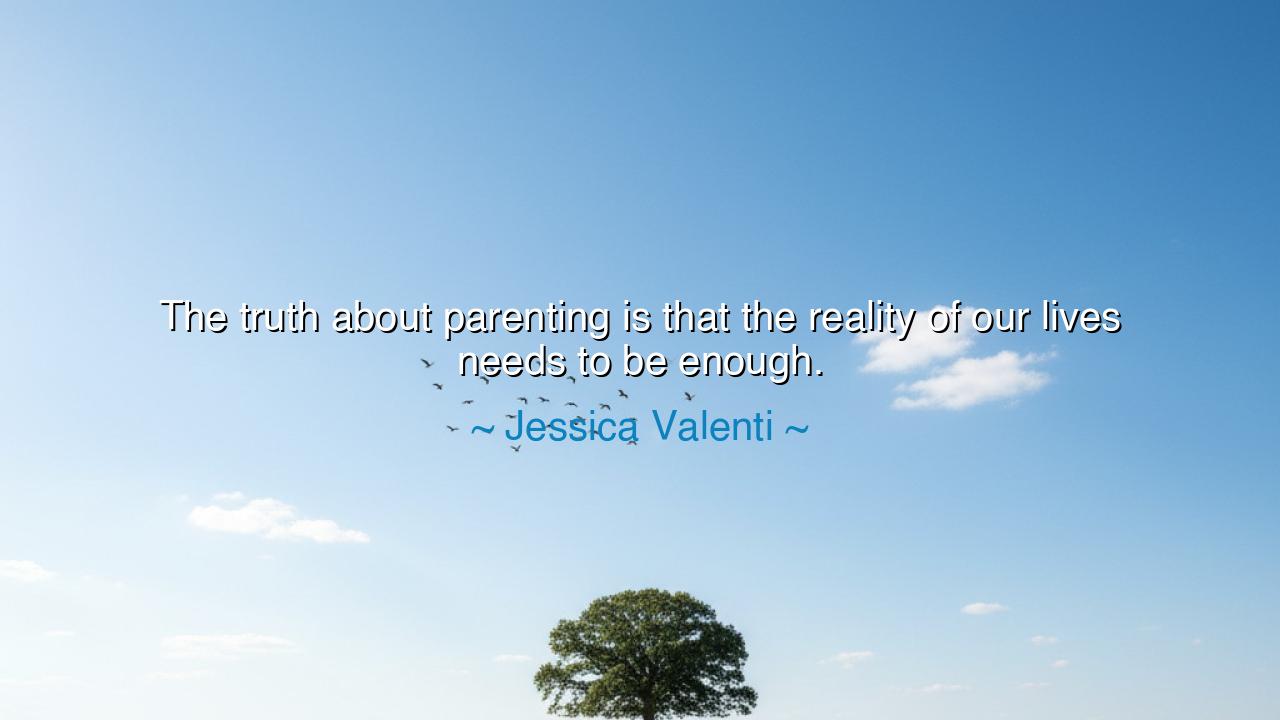
The truth about parenting is that the reality of our lives needs






Hearken, O seekers of wisdom, to the words of Jessica Valenti, who reveals a profound and grounding truth: that in the art of parenting, the reality of our lives must be embraced as sufficient. She speaks against the illusions of perfection, against the relentless pursuit of idealized images of family life, and reminds us that presence, honesty, and authenticity are the true pillars of nurturing. In her insight lies an ancient lesson: the well-being of children flourishes not in the grandeur of perfection, but in the steadiness, love, and sufficiency of what is real.
The origin of this wisdom lies in the human experience across generations. Ancient sages and storytellers have long observed that striving for unattainable ideals often obscures the simple, enduring acts that nurture the young. From the rural households of antiquity to the bustling cities of the Renaissance, the guardians who thrived did not perfect every detail, but offered love, attention, and consistent care within the bounds of their circumstance. Valenti’s modern reflection mirrors this enduring truth: the ordinary, lived reality of family life, when embraced fully, is more than enough.
Consider the life of Louisa May Alcott, the author of Little Women, who balanced the responsibilities of writing, caring for siblings, and managing a household. Alcott’s daily life was far from ideal by any external standard, yet in embracing the reality of her work, love, and presence, she nurtured both her family and her craft. Her devotion, patience, and resilience exemplify Valenti’s principle: that the truth of our lived experience, rather than the pursuit of perfection, forms the foundation of meaningful parenting.
The emotional resonance of Valenti’s words is profound. In an age of constant comparison and social expectation, parents may feel inadequate, perceiving their lives as insufficient for the task of nurturing. Yet she reminds us that children require not perfection, but presence; not grand gestures, but attentiveness; not flawless households, but loving engagement. The reality of life—its messiness, its limitations, and its joys—is not a deficit, but a fertile ground in which the child’s trust, confidence, and resilience may grow.
In practical terms, this insight demands acceptance and mindfulness. One must cultivate a clear vision of what is enough, embracing the routines, rhythms, and imperfections of daily life. Historical examples, from the care of children in Victorian England to contemporary families navigating busy lives, show that what children remember most is not the grandeur of provision, but the attentiveness, consistency, and engagement of those who raise them. The sufficiency of reality becomes the scaffold upon which trust, love, and security are built.
Valenti’s reflection also carries a heroic dimension: to accept the limitations of one’s life and to embrace them fully for the benefit of one’s children requires courage, humility, and integrity. Parenting is not merely a series of tasks, but a moral and emotional commitment to offer what is present, authentic, and available. By acknowledging the truth of circumstance, the parent models resilience, gratitude, and adaptability—qualities that will guide the child long after the immediacy of care has passed.
From this understanding arises a practical lesson: release the compulsion for perfection and embrace the sufficiency of your daily life. Focus on attentiveness, presence, and consistent care. Let the child witness your engagement, even amidst imperfection, and find security and love in the reality of your devotion. Create moments that honor what is possible, rather than striving endlessly for what is imagined, and teach through example the power of authenticity and acceptance.
Thus, the teaching of Jessica Valenti endures: the reality of our lives is enough for parenting, when approached with love, attention, and honesty. Let all who bear this sacred responsibility embrace what is real, rather than what is idealized. In doing so, they cultivate families rooted not in comparison or perfection, but in presence, care, and enduring trust—a foundation upon which the children of today will stand resilient, confident, and whole in the world of tomorrow.






AAdministratorAdministrator
Welcome, honored guests. Please leave a comment, we will respond soon